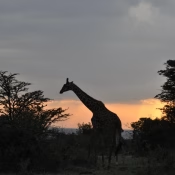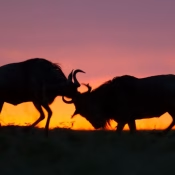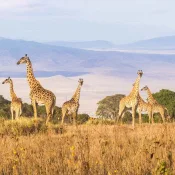Do I Need Insurance When on Kenya Safari?
When considering a Kenya safari, insurance is the first thing that likely comes to mind. What does this mean for your trip, and what are the options? Do you need it? How much should you expect to spend on coverage? All these are valid questions, and the answer depends on various factors. To help make things a little less confusing, we’ve put together this comprehensive guide on travel insurance for safaris in Kenya. By the end, you should understand what type of coverage is best for you and your trip, how to apply, and what to expect when making a claim.
What To Know About Travel Insurance?
In short, travel insurance is a type of protection that helps cover the cost of unexpected events while you’re away from home. This can include medical emergencies, trip cancellations, lost or stolen belongings, and more.
There are various travel insurance policies, and each has benefits and coverage options. The most common are comprehensive plans and basic plans. Comprehensive plans tend to offer
When it comes to insurance, two types are most relevant for safaris in Kenya:
- Trip cancellation
- Medical/evacuation insurance.
Trip cancellation covers you if you have to cancel your trip for a reason specified in your policy, such as illness, injury, or even political unrest.
Medical/evacuation insurance, on the other hand, covers you for emergency medical care and evacuation while on your trip.
While both types of insurance are essential, medical/evacuation insurance is typically required by tour operators to go on a safari. Depending on the policy, coverage can vary widely, so it’s essential to read the fine print before buying. When looking at procedures for safaris in Kenya specifically, you’ll want to make sure that your chosen plan covers activities like hiking, camping, and wildlife viewing.
How Much Does Travel Insurance for Safaris in Kenya Cost?
Travel insurance costs vary depending on several factors, such as the length of your trip, the type of policy you choose, and the coverage you need.
For example, a comprehensive plan for a two-week Kenya Safari can cost anywhere from $100 to $500, while a basic plan may be half that amount.
It’s also important to note that some tour operators include the cost of medical/evacuation insurance in their safari package price, so be sure to ask about this before buying a separate policy.
When Should You Buy Travel Insurance for Safaris in Kenya?
Ideally, you should purchase travel insurance as soon as you book your trip. This way, you’ll be covered if you have to cancel for reasons specified in your policy, such as illness or injury.
If you wait to buy insurance until closer to your departure date, you may not be covered for specific events, like political unrest or natural disasters.
How to Apply for Travel Insurance for Safaris in Kenya
Applying for travel insurance is typically a quick and easy process. Most companies will allow you to use and pay online in just a few minutes. Follow the following steps:
- Visit the website of a travel insurance company that offers coverage for safaris in Kenya.
- Enter your trip details, including the dates of travel, destination, and cost of your trip. You may also be asked to upload documents like your passport or proof of travel.
- Choose the type of policy you want and add any additional coverage options, such as medical/evacuation insurance.
- Fill out your personal information and contact details.
- Pay for your policy and receive confirmation of coverage.
What to Do if You Need to Make a Claim
The process is usually straightforward if you need to make a claim on your travel insurance for safaris in Kenya. Start by gathering all the relevant documentation, such as medical bills, police reports, and receipts for lost or stolen belongings.
Then, contact your insurance company to start the claims process. You may be able to do this online or over the phone. Most insurance companies will require you to submit a claim form, which you can usually find on their website. Once your claim is approved, you should receive a payment within a few weeks.
What To Consider When Choosing an Insurance Policy for Safaris in Kenya
When choosing an insurance policy for safaris in Kenya, there are a few essential factors to consider.
1. Activities
What do you intend to do when on a Kenyan Safari? If you plan to go hiking, camping, or participate in any other adventurous activities, make sure your policy covers these activities.
2. Coverage Plan
What type of coverage do you need? A basic policy will suffice if you’re only looking for trip cancellation and interruption coverage. However, if you want comprehensive protection, you may need to purchase a more comprehensive plan.
3. Cost
How much are you willing to spend on travel insurance? Keep in mind that the cost of your policy will usually increase with the length of your trip and the amount of coverage you need. Therefore, it’s essential to find a balance between cost and coverage.
4. Deductible
What is your preferred deductible? A higher deductible will usually result in a lower premium, but you’ll have to pay more out of pocket if you need to make a claim.
5. Pre-existing Conditions
Does your policy cover pre-existing medical conditions? If not, you may need to purchase a separate policy or rider that covers these conditions. This is also very essential to disclose any medical conditions you have to the insurance company. By doing this, you can easily claim without having any problems with your insurer.
6. Cancellation Policy
What is the cancellation policy of the company you’re considering? Some companies may charge a fee if you cancel your policy, while others may allow you to do so without penalty.
7. Customer Service
Is the company you’re considering easy to get in touch with? Do they have 24/7 customer service? These are essential factors to consider, especially if you need to claim while on your trip.
Choosing the right travel insurance policy for safaris in Kenya doesn’t have to be complicated. Keep these considerations in mind, and you’ll be well to find the perfect policy for your needs.
Top Coverage of An Excellent Travel Insurance
When planning to go on a Kenya safari, you must have a good travel insurance policy to protect you in case of any unforeseen circumstances. Here are some of the top things that an excellent travel insurance policy for safaris in Kenya should cover:
Trip Cancellation and Interruption Coverage
This coverage protects you if you have to cancel or interrupt your trip due to an unexpected event, such as a natural disaster or illness.
Medical Expenses Coverage
If you get sick or injured while on safari in Kenya, this coverage will help pay for your medical expenses. This can include hospital stays, prescriptions, and evacuation costs.
Baggage Loss or Delay Coverage
This coverage protects you if your baggage is lost, stolen, or delayed. It can also cover the cost of necessary items if your luggage is delayed for more than 24 hours.
Emergency Evacuation Coverage
If you need to be evacuated from Kenya due to an emergency, this coverage will help pay for the costs. This can include airfare, transportation, and lodging.
Pre-existing Conditions Waiver
If you have a pre-existing medical condition, some insurance companies will waive the exclusion if you purchase your policy within a specific time frame of your trip.
Weather Coverage
If your safari is canceled or interrupted due to bad weather, this coverage will reimburse you for non-refundable costs, such as airfare and lodging.
The Bottom Line
When planning a Kenya safari, purchase a travel insurance policy to protect you from unforeseen circumstances. Look for a policy that offers comprehensive coverage and 24/7 customer service. Then, follow the tips to choose the best approach for your needs. With the right policy, you can relax and enjoy your safari, knowing you are protected.






